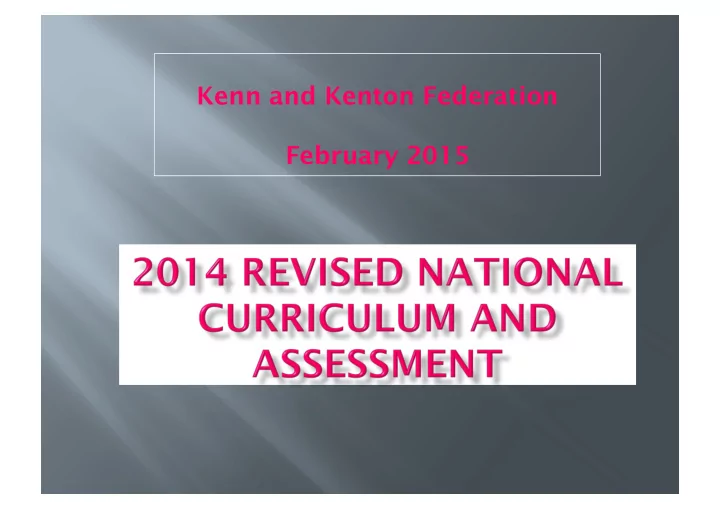

Kenn and Kenton Federation February 2015
The DFE has made the biggest change to • education in 20 years. This year is the year of transition. •
The New National Curriculum 2014 was introduced in � September 2014 for all primary schools for years 1, 3, 4 and 5, being extended to years 2 and 6 from September 2015. With this there comes an increase in expectations in � what children need to learn in each year group in Maths and English and a change in emphasis in aspects of other areas of the curriculum. There is a strong focus on what children now need to � learn in order to be working in line with new expectations for their year group (Age Related Expectations - ARE).
Increased expectations, particularly in Maths, English and � Computing. There is less content to cover in the primary years curriculum, but � more depth is required. All pupils will be expected to build firm foundations and not be � accelerated to content expected in secondary school. English, Maths and Science are still the 3 core subjects which make � up the bulk of the timetable. The other 8 foundation subjects play a key part in providing a � broad and balanced curriculum –art, computing, design and technology, geography, history, languages, music, P.E. All schools are also required to include Religious Education and Spiritual, Moral, Social and Cultural learning, although the content of this is agreed locally. (See changes sheet)
For children in Year 2 and Year 6, the new curriculum � won’t become statutory until 2015. This is because these children are in the last year of � the Key Stages, the years when children are formally assessed to judge their progress against the requirements of the curriculum. Because the 2014 curriculum will only have been in � place for nine months, these children will be assessed against the requirements of the old curriculum in the National Curriculum Tests. New tests will be produced for the summer of 2016 to � assess work from the new curriculum.
� No longer using levels to assess children. � Schools are required to develop and implement their own means of assessing children’s progress. � Again 2014-15 is a year of transition. � Assessment needs to be related to Age Related Expectations (ARE).
We have made good progress in developing our assessment system – � based on continual assessment, with assessment criteria built in to every-day planning and teaching. Teachers will be assessing each objective that children are working on. � From these assessments judgements will be made at set times in the � year as to whether a child is – � Emerging, working below age related expectations Developing, working towards age related expectations Secure, working at age related expectations Mastery, working above age related expectations During much of the school year the vast majority of children will be � Emerging or Developing in their ARE, as they have not yet been taught the year’s objectives. By the end of the year the vast majority of children will be Secure in their ARE.
� The DFE and OFSTED have recognised that there will appear to be a fall in children’s attainment initially due to the increased expectations of the new curriculum. � It needs to be noted that rapid progress for children is expected during the introductory period. � Reporting to parents will change in the short-term for parents at Kenton due to the implementation of this change – mid-year reports will be introduced and full end–of-year reports will be in place. For Kenn parents this will be no change.
� Teachers in both schools are confident in the teaching and assessing cycle and know how to enable children’s learning to progress effectively. It is only how this is reported to parents that will be different, including new terminology for parents to understand.
Recommend
More recommend